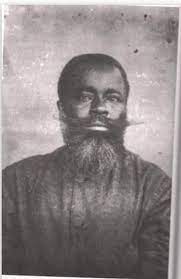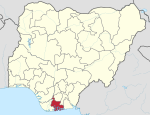
The Ijaw people, otherwise known as the Ijo people, are an ethnic group found in the Niger Delta in Nigeria, with significant population clusters in Bayelsa, Delta, and Rivers. They also occupy Edo, Ondo, and small parts of Akwa Ibom. Many are found as migrant fishermen in camps as far west as Sierra Leone and as far east as Gabon. They account for about 1.8% of the Nigerian population according to CIA Factbook. The Ijaws are one of the most populous tribes inhabiting the Niger Delta region and the eighth largest ethnic group in Nigeria.

Okrika is an island in Rivers State, Nigeria, capital of the Local Government Area of the same name. The town is situated on an island south of Port Harcourt, making it a suburb of the much larger city.
Opobo is an Igbo-creole-speaking community in Rivers State and Akwa Ibom State, Nigeria.

King Jaja of Opobo belonging to the Igbo ethnicity, was the founder and first king of the Opobo Kingdom in present-day Rivers State and Akwa Ibom State of Nigeria.

The Aro Confederacy (1640–1902) was a political union orchestrated by the Aro people, an Igbo subgroup, centered in Arochukwu in present-day southeastern Nigeria. The Aro Confederacy kingdom was founded after the beginning of the Aro-Ibibio Wars. Their influence and presence was all over Eastern Nigeria, lower Middle Belt, and parts of present-day Cameroon and Equatorial Guinea during the 18th and 19th centuries. The Arochukwu Kingdom was an economic, political, and an oracular center as it was home of the Ibini Ukpabi oracle, High Priests, the Aro King Eze Aro, and central council (Okpankpo). The Aro Confederacy was a powerful and influential political and economic alliance of various Igbo-speaking communities in southeastern Nigeria. It emerged during the 17th century and played a significant role in the region until the late 19th century.
Bonny Island is situated at the southern edge of Rivers State in the Niger Delta region of Nigeria near Port Harcourt. Ferries are the main form of transport, though recently an airstrip has been built and it’s fully functional - with flights from Lagos, Abuja and Port Harcourt respectively to and from the island. The local dialect spoken in Bonny Island are Igbo language and Ibani language.

The Aro people or Aros are an Igbo subgroup that originated from the Arochukwu kingdom in present-day Abia state, Nigeria. The Aros can also be found in about 250 other settlements mostly in the Southeastern Nigeria and adjacent areas. The Aros today are classified as Eastern or Cross River Igbos because of their location, mixed origins, culture, and dialect. Their god, Chukwu Abiama, was a key factor in establishing the Aro Confederacy as a regional power in the Niger Delta and Southeastern Nigeria during the 18th and 19th centuries.

The Obolo people also known as Andoni or Doni, are a multi-ethnic group in the Niger Delta region of Nigeria. Obolo people are primarily found in Rivers State and Akwa Ibom State, however, they are also are present in the states of Bayelsa, Cross River, Abia, and Enugu.
The Ibani tribe are a mixed Ijaw ethnic group who live in the Bonny and Opobo areas of Rivers State, Nigeria, on the Atlantic coast. Bonny town is the tribal seat of the Ibani which is located on the bight of Bonny River. Ibani language is spoken predominantly by residents of Bonny and Opobo. Igbo is also widely spoken amongst the people and considered a general language.
The Engenni people live in the Niger Delta region of Nigeria. They are considered to be Edoid based on linguistic grounds. They live in close proximity with Ijaw people. They primarily live in Ahoada west local government area of Rivers state, Nigeria. Although they consider themselves to be Engenni, the Engenni speak an Edoid language. Alagoa (2003) said: “---The penetration of the Niger-Delta by Edoid groups extends to the Epie-Atissa and Engenni of the central and Eastern Niger-Delta----The Epie, along with the Ogbia and other groups of the central and eastern Niger-Delta, are historically united with the Ijaw.” The other groups of the central and eastern Niger-Delta which Professor Ebiegberi Alagoa said that were historically united with the Ijaw, include the Engenni, as shown from his narrative above. The Engenni have close relations with neighbouring Ijaw tribes such as the Zarama and Epie-Atissa.

Ikot Abasi is located in the south west corner of Akwa Ibom State, Nigeria. It is bounded by Oruk Anam Local Government Area in the north, Mkpat Enin and Eastern Obolo Local Government Areas in the east and the Atlantic Ocean in the south. The Imo River forms the natural boundary in the west separating it from Rivers State. The Federal University of Technology Ikot Abasi is a federal government-owned university located in Ikot-Abasi.
Oloibiri is a small community in Ogbia LGA located in Bayelsa State, in the eastern Niger Delta region of Nigeria. The inhabitants of Oloibiri community are mainly fishermen and farmers. It is the first place that oil was discovered in Nigeria.

The Nembe Kingdom is a traditional state in Niger Delta. It includes the Nembe and Brass Local Government Areas of Bayelsa State, Nigeria. The traditional rulers take the title "Amanyanabo". Today, leadership is split between the Amanyanabos of Ogbolomabiri, Bassambiri, Okpoama, Odioama and Twon Brass.
The Kingdom of Bonny, otherwise known as Grand Bonny, is a traditional state based on the town of Bonny in Rivers State, Nigeria. In the pre-colonial period, it was an important slave trading port, later trading palm oil products. During the 19th century the British became increasingly involved in the internal affairs of the kingdom, in 1886 assuming control under a protectorate treaty. Today the King of Bonny has a largely ceremonial role.

Chief Oko Jumbo was an Igbo chief of slave descent in the Kingdom of Bonny, a state in the Niger Delta, now part of Rivers State, Nigeria. For many years in the 19th century he was the effective ruler of Bonny. Though the king in Bonny, and Warribo was the head of the Manilla House, "Oko Jumbo and Ja Ja were looked upon by every one as being the rulers of Bonny."

The Kalabari Kingdom, also called Elem Kalabari, is the independent traditional state of the Kalabari people, an Ijaw ethnic group, in the Niger River Delta. It is recognized as a traditional state in what is now Rivers State, in southern region of Nigeria.
John Ikuru (1877–1947) was the son of king Ikuru Efuya, founder of Ikuru Town and Madam Obiringene of Opobo; his mother came from Ekede. He was born in 1877 in Ikuru Town, and had his primary school education at St. Paul's School, Opobo/Nkoro, from 1887 to 1895, and secondary school education at the Wesley Boys’ High School, in Lagos. At that time, Christianity was already sweeping through the entire Western Region of now Nigeria and the Niger Delta, through the evangelistic activities of the Church Missionary Society with Bishop Ajayi Crowther as the pioneer Missionary. So, trained in Lagos, John Ikuru embraced Christianity and became exposed to Christian ethics and philosophy.
The Niger Delta Avengers (NDA) is a militant group in the Niger Delta region of Nigeria. The group publicly announced their existence in March 2016.
The Unyeada Kingdom, sometimes referred to as "Ayanda" a corrupted version of Unyeada, some literal version interpreted it as "prowess of Edabiri". Unyeada is an ancient riverine settlement (Kingdom) located in western part of Obolo Land, administratively in Andoni Local Government Area of Rivers State, Nigeria. Situated in the south of Ogoni tribe and Kingdom of Bonny to the west and Eastern Obolo to the east. Unyeada territory stretches from Iburubu Sea near the mouth of Andoni River to Okwan Obbu or Imo River.

King Otuo Ogbalakon (Ogbolakon) or King Otuo was the 17th-century warrior-king of Obolo (Andoni) people in the Eastern Niger Delta. He was unpopular for fighting against Bonny and their colonial allies. Her mother, princess Ariaunwa Okpok-Ogbolikan of Old Unyeada was recorded by history as the first Obolo (Andoni) Princess to rule as a monarch (Okaan-Ama) after the demise of her father, King Ikana Okpok of Edabiri dynasty in the 17th century. Princess Ariaunwa married Prince Ogbolaikon of Alabie now known as Agwut-Obolo and begat Otuo. In 1792, when Otuo became of age he was crowned as the King of Old Unyeada Kingdom.












